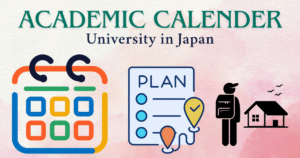Clarify your application requirements before you start—doing so will save time, reduce stress, and significantly improve your chances of success.
Japanese universities attract thousands of international applicants each year with research‑driven programs, cutting‑edge facilities, and generous scholarships. Yet many strong candidates stumble because they overlook one simple rule: every school—and often every graduate school within the same university—sets its own admission requirements. Below are the five pillars you must master, presented in the order you will encounter them. Pay special attention to Requirement 3 (Research & Academic Capability) and Requirement 4 (University‑Specific Screening); admissions officers repeatedly note that these two stages decide most final offers. It is important to recognize that this is different from undergraduate admission procedures.
1. Academic Background
A master’s applicant must prove they have the right degree level and academic foundation.
Minimum degree level
Most universities require a four‑year bachelor’s degree or at least 16 years of formal education. The University of Tokyo, for example, states that applicants must “have completed or expect to complete 16 years of education abroad” before enrollment.
GPA & transcript evaluation
Competitive programs generally expect a B-average or higher across your undergraduate coursework, with special attention often given to advanced courses completed in your final two years.
Equivalency & non‑traditional routes
If you finished a three‑year bachelor’s or hold a professional qualification, you may still apply. Many graduate schools allow an individual screening for equivalency—but you must submit additional documents (research papers, publications, proof of professional research) well ahead of standard deadlines.
2. Language Proficiency — JLPT N2/N1 or TOEFL/IELTS
Even in English‑medium programs, universities need proof you can thrive in class and lab discussions.
Japanese track
Some graduate programs taught in Japanese, such as Kyoto University’s Graduate School of Management and Kyoto Seika University, require applicants to hold JLPT N1.
English track
For English‑medium degrees, typical thresholds are TOEFL iBT 79–90 or IELTS 6.0–6.5. Kyoto iUP expressly lists TOEFL iBT, PBT, or IELTS, and even explains exemption rules for native speakers.
3. Research & Academic Capability — GRE, Research Plan, Relevant Experience ★Critical
Your research fit is the single biggest filter in Japanese graduate admissions.
GRE (case‑by‑case)
Although not universal, engineering, science, and business programs occasionally request GRE scores; a combined 310+ is competitive Qogent Global. Where it is “optional,” a strong score can still tip the scale in your favor.
Field of Study & Research Plan (FSP/RP)
Virtually every university asks for a detailed Research Plan outlining your topic, methodology, timeline, and potential supervisor. The plan is reviewed by multiple faculty members and forms the basis of later interviews.
Demonstrated experience
Practical experience—such as working in a research group, publishing a paper, or giving a conference talk—shows that you can turn your ideas into real results. When competition is tight, applicants with any concrete achievements, even small ones, usually rank higher than those who only describe their plans.
4. University‑Specific Screening — Research Proposal, Letters of Recommendation, Interview ★Critical
After document review, applicants face institution‑designed evaluations.
Research proposal defense
At the University of Tsukuba, candidates give a 15‑minute presentation on their research plan followed by technical questions in the chosen language. Similar defenses exist nationwide.
Letters of recommendation
Most schools request two to three letters from professors or industry supervisors familiar with your academic rigor and character. Some faculties supply a mandatory form; others accept open letters—read guidelines carefully.
Interview (oral examination)
Expect a mix of research‑specific and general questions about motivation and future goals. Tsukuba allocates up to 45 minutes per candidate, and Tokyo universities often conduct interviews online for overseas applicants.
Key takeaway:
This stage can carry more weight than your past scores. A clear, confident pitch of your project and a strong match with a professor can balance out an average GPA.
5. Financial Preparation & Scholarships
Even with tuition lower than many Western countries, Japan requires solid funding proof.
Tuition & fees
National universities charge roughly JPY 535,800 per year plus a one‑time admission fee (~JPY 282,000). Private institutions may double that figure.
MEXT Scholarship
The Japanese Government (MEXT) Scholarship remains the most coveted award. It offers full tuition, a monthly stipend of about JPY 144,000, and round‑trip airfare. I strongly recommend that you apply for the MEXT scholarship.
JASSO Honors Scholarship
The Japan Student Services Organization (JASSO) offers the Monbukagakusho Honors Scholarship for Privately-Financed International Students. It provides a stipend of JPY 48,000 per month for up to 12 months. While it does not waive tuition, the allowance helps offset living costs. Candidates can secure a pre-arrival reservation by achieving a high score on the EJU or be nominated by their host university after enrollment; selection is competitive and considers GPA and financial need.
University & external grantsnterview (oral examination)
Tokyo Tech, Osaka University, and many private foundations run separate scholarships covering partial or full fees. Application windows often coincide with admission deadlines, so prepare both sets in parallel.
Personal budgeting
Apart from tuition, plan for living costs of ¥120,000–¥150,000 per month in major cities. Proof of funds—bank statements or sponsor letters—for at least one year is typically required when applying for your Certificate of Eligibility (student visa).
Conclusion
Japanese master’s admissions reward applicants who clarify their requirements early and tailor each document to the target program. While all five pillars matter, your Research & Academic Capability (3) and University‑Specific Screening performance (4) usually decide the final offer. Map deadlines backward, speak to potential supervisors, and build a realistic funding plan. With these steps, you can turn a complicated process into a clear, achievable roadmap—and start your graduate journey in Japan with confidence.


